Memo #321
By Joseph Yi – joyichicago [at] yahoo.com, Joe Phillips – joephillips5 [at] gmail.com, Heather Yang – heatheryang0102 [at] gmail.com
The LGBT (Lesbian, Gay, Bisexual, Transgender) occupy a peculiar place in South Korean society. By maintaining somewhat sexually free, separate social enclaves, they avoid significant public backlash and government oppression. However, they have no legal protection and face subtle cultural-familial pressure to marry the opposite sex. Some LGBT pursue a politically activist model seeking government protection, but this strategy confronts an indifferent public and a determined opposition from some evangelical Christian groups. The vocal opposition is partly fuelled by the legal successes of gay activists, especially same-sex marriage, in the West.
There is a third, less recognized but increasingly common model of LGBT integration in South Korea. Individual LGBT persons—both native- and foreign-origin—nurture communicative social ties with members of the larger society in non-political settings, such as gatherings of school friends, civic organizations and university forums. For instance, Seoul City Farmers (SCF) is a broadly inclusive organization of would-be urban farmers that has included several gay members. The Open Doors Community Church, located in Seoul, is the first bilingual, LGBT-affirming church in Korea with members who are LGBT, non-LGBT, native Koreans, and foreigners. Other inclusive, multiethnic organizations include Animal Rescue Korea, LanguageCast, and Yoga4Peace.
These “safe spaces” allow LGBTs and non-LGBTs to interact as individuals, rather than as representatives of opposing factions, develop close friendships, and discuss, with varying degrees of honesty, the lives and challenges of the LGBT in Korea. Less-politicized settings invite participation from members of groups who are relatively mute in more-politicized environments, such as young, moderate evangelical pastors. These bridging environments reinforce larger, societal trends in Korea toward accommodating ethnic and social diversity, especially among younger, college-educated persons.
Although activist strategies have contributed to many legal gains in the West, they have also polarized debate, undermined mutual dialogue, and fostered a religious counter-campaign. The bridging model not only offers an opportunity for Korea to integrate LGBTs but to do so through respectful, civil dialogue about the lives and challenges of minorities. The model seems particularly suitable for East Asian societies where Confucian-style principles of non-confrontational and interpersonal harmony, and affective networks, exist alongside evolving liberal-democratic ideals.
About the Authors:
Joseph E. Yi is an assistant professor of political science at Hanyang University.
Joe Phillips is an associate professor of global studies at Pusan National University
Heather Yang graduated from Hanyang University with a BA in Political Science.
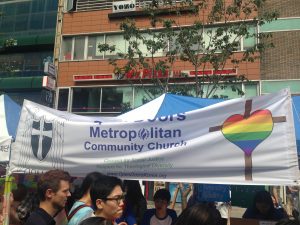
The 15th annual Korea Queer Festival held on Saturday, June 7, 2014, in Sinchon, a famous university neighborhood of Seoul (Credit: Heather Yang).
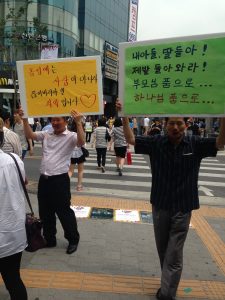
Protests from some conservative Christians at the 2014 Korea Queer Festival. On the left, “Homosexuality is not love; it’s a sin that must be stopped”; on the right, “My sons and daughters! Please come back! To the embrace of your parents… the embrace of God…” (Credit: Heather Yang).
Links:
- Joseph Yi, Joe Phillips and Shin Do Sung, “Same-Sex Marriage, Korean Christians, and the Challenge of Democratic Engagement,” Society, 51 (July/Aug. 2014)
- Y.D. Bong, “The Gay Rights Movement in Democratizing Korea,” Korean Studies 32 (2008)
- John (Song Pae) Cho, “The Wedding Banquet Revisited: ‘Contract Marriages’ between Korean Gays and Lesbians,” Anthropological Quarterly 82, no. 2 (Spring 2009)
- Douglas Sanders, “Mujigae Korea” (2009)
- The Korea Times, “LGBT Forum in Korea Faces Resistance” (October 2013)
- Joseph Yi & Joe Philipps, “Paths of Integration for Sexual Minorities in Korea,” Pacific Affairs (forthcoming)
Related Memos:
See our other memos on South Korea.
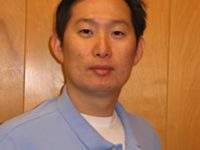
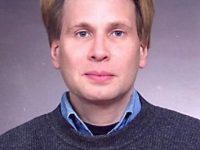
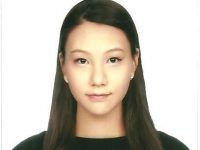
Comments are closed, but trackbacks and pingbacks are open.